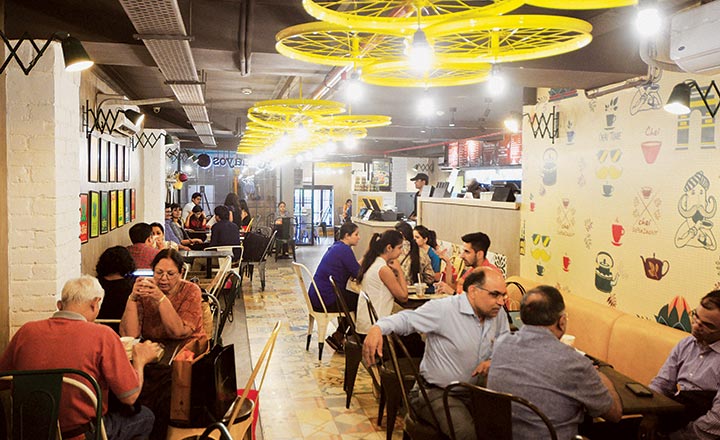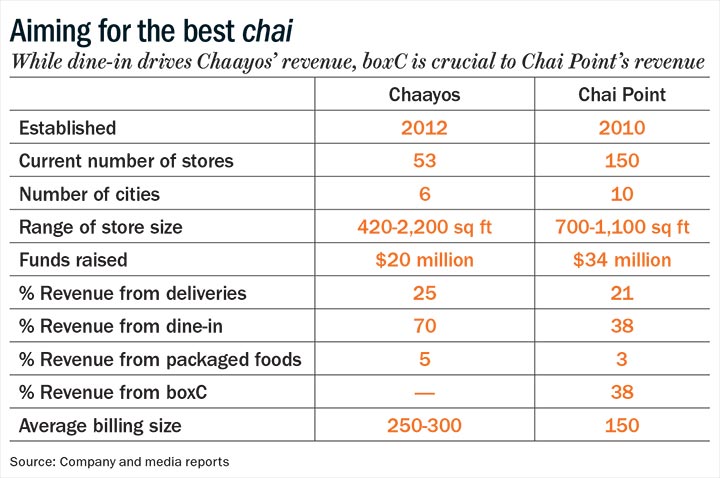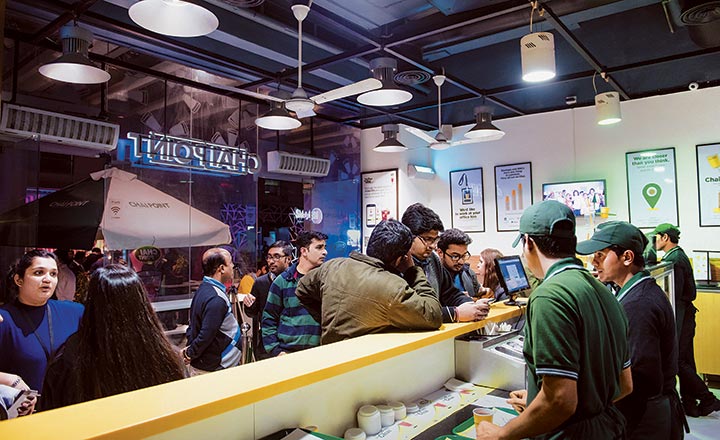It is a pleasant Tuesday morning in end-February when I step into the Chaayos outlet on Golf Course Road in Gurugram. I enter my phone number in the tab placed on the counter while an attendant takes down my order — “Adrak tulsi masala chai with cardamom extracts”, I say and pay. Sounds the usual, right? Now here’s where the unusual starts. There is no one rushing to make the tea as per my requirements. Nor is it poured into a cup from a flask. Instead, the order is automatically passed on to a fully automated machine that kicks into action. Water is poured into a bowl placed on an induction stove. As it boils, there are multiple pipes pouring in milk and the required extracts — as per the customer’s order — and soon, the tea is ready to be served.
Meet Chai Monk, an IoT-powered chai robot that has fully automated the process of making tea. “This is a 100% indigenously designed product by a team of three people. All Chaayos outlets in the north are equipped with this technology. And it will soon be incorporated in our stores in Mumbai,” says Nitin Saluja, founder and CEO, Chaayos. The technology, which has been under works since December 2015, was rolled out in July last year.
Similarly, at Chai Point, technology has crept into the tea and coffee making process through boxC, an IoT-enabled vending machine that is installed at over 900 corporates across 10 cities and provides freshly made tea and coffee at the tap of a finger. Rolled out in 2016, Chai Point has installed about 2,500 boxC machines that constitute 38% of their total revenue. Along with dine-in and deliveries, boxC is a channel that the company is betting big on.

And this is just the beginning. Chai Monk and boxC join the long list of innovations, additions and changes that two of the biggest players — Chai Point and Chaayos — in the tea-café sector in India have been introducing over the past few years. While both have a unique business model, what is common is a strong focus on improving efficiencies, reducing costs and serving the perfect cuppa to their patrons.
Ravi Wazir, hospitality and food business consultant, says that these players have done quite a few things well. They’ve researched the pain points and delivered customer solutions supported by strong supply chains and technology, which helps them replicate success consistently. “Also, they’ve tested consumer responses to their value proposition by attempting different formats of service and delivery across a variety of locations. They’re nimble in their decisions and haven’t allowed their funding to blind them,” he adds. Chai Point has raised $34 million while Chaayos has raised $20 million in multiple rounds (see: Aiming for the best chai).

Setting The Kettle
Before diving into technology, let us rewind to the time when the founders of Chai Point and Chaayos first conceived the idea of a tea café. For Amuleek Singh Bijral, this was way back in 2010, after quitting his job as the head of India operations at RSA Security. Intrigued by the absence of quality tea drinking joints, he started with a small pilot store in Bengaluru in 2010. He then incorporated the Mountain Trail Foods, and opened a 150 sq ft store in Koramangala, which served tea at Rs.7 per cup.
The success of the store encouraged him to raise an angel round of funding, of Rs.20 million, in 2011 to pursue this as a serious business idea. He then started opening Chai Point stores for the blue collar workforce. After opening about 14 Chai Point outlets in Bengaluru, he realised that the current target customer is apprehensive about paying a premium and instead, switched his focus on the white collar workforce. Consequently, he shut down all the Chai Point stores by the end of 2012, raised a fresh round of investment in beginning of 2014 ($1.7 million from Saama Capital) and relaunched Chai Point.
Revenue as well as repeat buying improved substantially and Bijral knew he had found the sweet spot. Today, from one store near MG Road Trinity Metro station, Chai Point has 150 stores across 10 cities and plans to open about 50 stores this year. Its revenue run rate for FY19 is Rs.2 billion, and Bijral is confident of turning Ebitda positive.
The journey is similar for Saluja, who graduated from IIT Bombay in 2007, but was always interested in starting a business venture. After working with Opera Solutions in the US for six years, Saluja moved back to India and began researching for his start-up idea. “India is a chai-drinking nation and there should be a place other than home where Indians can get a good cup of chai. But all that you could think of are chai tapris. No place to have good cup of chai with family,” says Saluja. This observation prompted him to start Chaayos under Sunshine Teahouse in 2012.
With Rs.1.2 million investment, Saluja opened a 500 sq ft store in Cyber City in Gurugram in 2012. Its success can be gauged from the fact that on day one itself, they sold 700 cups of tea. Currently, Chaayos runs 53 stores in six cities (with plans to open around 24 stores each year) and is confident of growing its revenue by more than 50% from Rs.520 million in FY18.
Flavouring With Food
Besides perfecting their brew, both Chai Point and Chaayos have successfully mined adjoining product categories to elevate the tea drinking experience. For instance, at Chai Point, the menu comprises healthy eating options such as sandwich, tomato vermicelli and masala daliya. Saluja too has his eyes set on diversifying his food portfolio. “Food such as vada pav, bun maska, ghar wala and aloo sandwich were introduced from first store itself. There is food of only a certain kind that goes well with chai. That is our filter for introducing anything,” he explains.
While tea is the unique value proposition for both, sales from food constitute about 31% at Chai Point and 50% in Chaayos. Experts opine that offering this combination of tea and quality food has actually given an edge to these players. Harminder Sahni, founder and MD at Wazir Advisors notes, “It was never about coffee or tea but a quality space to sit, meet and hangout. Coffee joints created those spaces and became successful in spite of serving sub-standard coffee and atrocious food. Moment the same quality spaces started serving tea and good snacking food, the consumers flocked.”
Brewing Ambience
Sahni’s observation brings us to an important part of the Chai Point and Chaayos journey, which is innovation on setting the right ambience. Saluja says that when he started out, he was advised by many that, in order to build a brand, there needs to a consistent look and feel to the store. “I am happy to say we busted that myth,” says Saluja. Ranging from 2,200 sq ft to 420 sq ft, every Chaayos outlet is designed uniquely based on its location.
Bijral has adopted a similar mantra by not just tweaking store sizes, but also introducing features depending on store locations. So while the one outside Bengaluru airport has only a pick up counter, the one at the Trinity Metro station has an enclosed glass room enabled with charging points and Wi-Fi to cater to the office-going crowd. In contrast, the ones at Church Street and Indira Nagar have a more plush, lounge kind of look and feel. They have also introduced the concept of a ‘shutter’ window for the delivery executives to pick up the orders, so that the dine-in customers are not inconvenienced. These shutters are placed behind the counters and can be accessed by the delivery executives through a separate entrance at the store.
“When something is as mass as tea is, it is difficult to make it a classy offering that demands and commands a high premium in a tea-bar setting. Innovation in this space is all about the experience in a tea bar — the ambience, the exotica of tea, and the accoutrements that reach the table,” says Harish Bijoor, brand-expert and founder, Harish Bijoor Consults, adding that this is what players such as Chaayos and Chai Point have been successful in doing.
Such focus on ambience has led to a sharp spike in footfalls and rise in their popularity. A 2018 Euromonitor report, titled Tea in India, notes that ‘Tea houses have been successful in attracting millennials due to their premium offerings and wide array of different tea variants. Consumers are predicted to increasingly frequent these establishments in order to explore the variety of teas available and experience their premium ambience.’
Packing It Right
Another innovation pioneered by the tea cafés is the development of heat retention flasks. One of the fundamental problems Bijral saw was in the delivery space, as the beverage would get cold by the time it reached the customer. In 2015, after about nine months of research, the Chai Point team created a disposable flask that retains heat for 45-60 minutes. Incidentally, this is an area, which the coffee joints have still not innovated on. With deliveries growing faster than dine-ins, the innovation of this flask has been crucial in the growth of Chai Point. Deliveries today constitute around 21% of their revenue and they receive about 10,000 delivery orders a day. The concept of heat retention flask has now been adopted by most players in this space.
Sahni notes that tea is far cheaper than coffee in raw form. Thus every cup of tea makes money even at half the price of coffee cup. The cost of innovation will be paid off by the scale these companies can potentially achieve, he points out.
Chai Point and Chaayos have also begun focusing on developing packaged food business. While Chai Point retails tea powder, cardamom, ginger, jaggery and cinnamon extracts (that is sold along with boxC to corporates as well as their outlets), Chaayos has created a range of instant tea mixes, where the customer just needs to add a cup of hot water. Both founders have also begun dabbling with products such as chips, mathris, rusks and puffs that are sold in small packs at their outlets and online channels.
These dip stick experiments are not to compete with larger FMCG players, but simply augment the experience of its patrons. Saluja adds that what will work best for Chaayos is a medley of snacky products from different parts of the country. Packaged food business is currently 2-3% of total revenue for Chai Point and 5% for Chaayos.
Bots Take Charge
Having got the location, ambience and packaging right, Chaayos and Chai Point turned their attention to technology. At Chai Point, the team observed that many offices in the vicinity came in with large orders on a daily basis. That is when they realised that institutional business is so large, sowing the seed for boxC in 2013-14.
The fully automatic IoT-enabled dispensers were built in 2015 (the latest version was launched in 2017) by 40 in-house engineers. It is a cloud-based platform for beverage services, built on a platform called Shark, enabling corporates to provide employees with fresh tea and coffee made with authentic ingredients. Installed at locations such as hospitals, educational institutions and airline lounges, boxC assures companies high uptime level of beverage services and transparency on billing. In November, it also partnered with Paytm to provide an integrated payment solution. Developing this technology required about Rs.70-Rs.90 million in addition to costs incurred on invoicing and billing, and internal software development. Though it is a high capex innovation, the payback on the machines is healthy.
And while boxC is used at corporates, Chaayos’ innovation, Chai Monk, has been used across its northern stores and will soon make its way across all stores. “The tea bot remembers your preference and maintains consistency of taste at all times,” says Saluja. With the introduction of Chai Monk, no chai is made with hands at the Chaayos’ outlets. Besides providing consistency, the time taken for making a cup of tea has been reduced by 40 seconds from the earlier 2.30 minutes. Thirdly, the machine ensures precision in tea-making, as a result of which wastage has gone down significantly.
Deepak Gaur, MD, SAIF Partners, which has invested in Chaayos, believes that Chai Monk is a phenomenal innovation. “In addition to efficiencies and costs, Chai Monk enhances customer experience. Also, servers or staff in café get more time to address customer needs and speed of serving goes up. The equipment has been very thoughtfully designed,” he adds.
Going forward, Saluja plans to introduce more varieties of tea, including green and black tea for the lactose-intolerant consumers. Chai Point meanwhile can augment the capabilities of boxC by using the tab installed on the device for facial recognition and artificial intelligence to remember the taste and preferences of a customer. The possibilities, as it is evident, are endless.
As they diversify into newer product categories, innovate on ambience and technology, one thing is clear — the experience that a customer has through their dine-in, delivery and add-on products has to be the same. It is an omni-channel business model that they have adopted, and have set high standards for themselves to match. The tech play propels them ahead of newer players joining the fray. But there is no time to sit on their laurels. Because someone, somewhere, is already brewing the next cup!












 Just one email a week
Just one email a week